Soldiers share experiences with diversity in the Kentucky National Guard
Hear from three diverse soldiers on their paths to the Kentucky National Guard
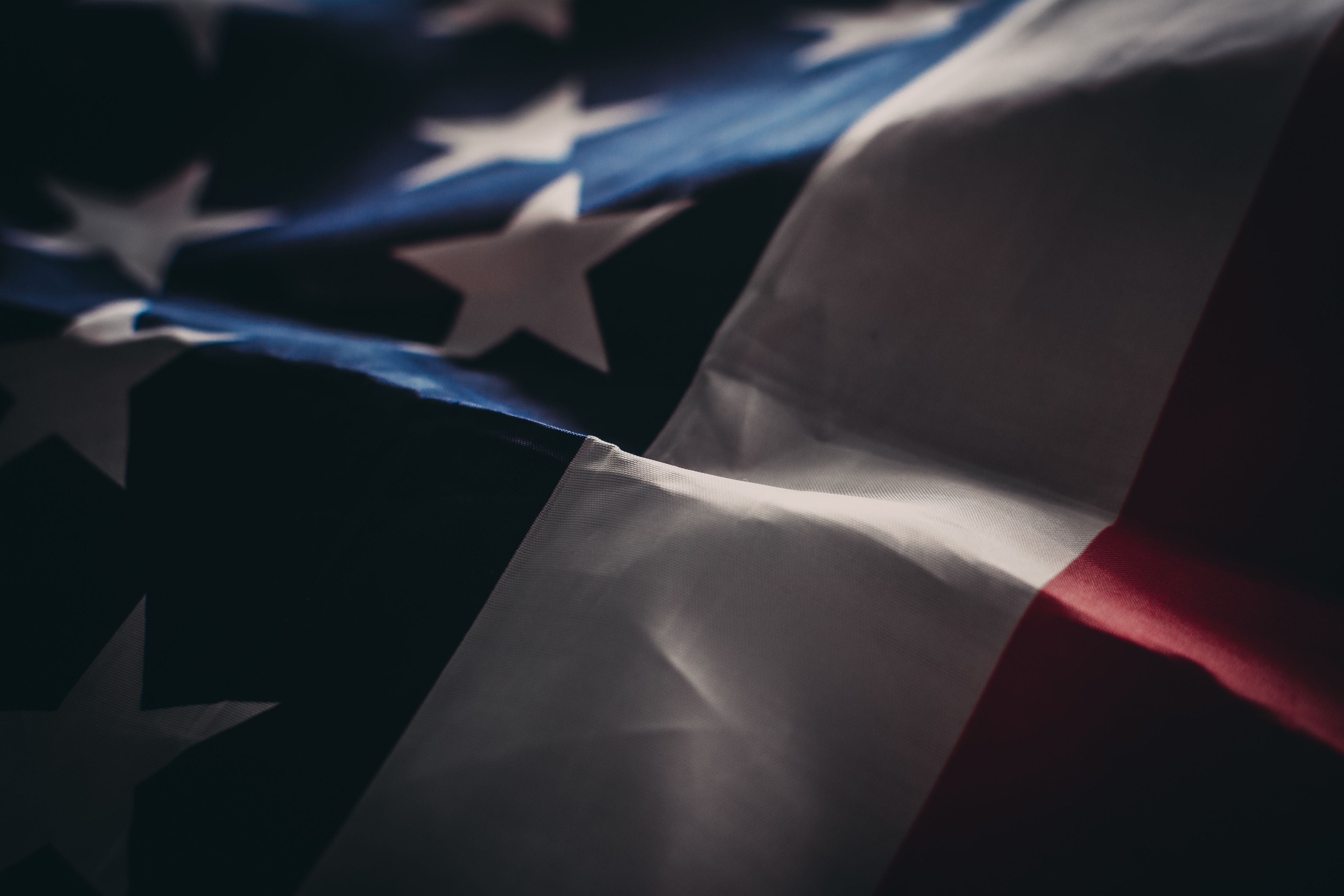
EDITOR’S NOTE: We consulted diversity, equity, and inclusion professors at Eastern Kentucky University to ensure we were sensitive in using the term “minority.” MilitaryOneSource identifies non-white members as “minorities”; however, after careful consideration, we have chosen to refer to them as “diverse” members of the National Guard.
The Kentucky National Guard ranks No. 29 in the nation in diversity numbers, yet overall diversity has improved in the past 20 years.
Since 2010, the Guard has seen a steady increase nationally in the number of members identifying as diverse. In 2020, the Guard reported 81,943 diverse enlisted members and officers, up by over 11,000 in 10 years.
According to Military OneSource, an organization affiliated with the Department of Defense (DOD), 929 Kentucky Guard members identified as diverse in 2020, meaning 85.9% of the Kentucky Guard was white.
While the numbers may seem troubling, there have been efforts in the Guard to improve diversity.
Chief Warrant Officer 3 Joseph Lyddane is an equal opportunity adviser (EOA) in the Kentucky Guard. EOAs are appointed by commanders to ensure equity and fairness are maintained in units.
EOAs travel to The Defense Equal Opportunity Management Institute (DEOMI) in Patrick’s Air Force Base outside of Melbourne, Florida, for 33 days of hands-on EOA diversity training.
“... whether it be Louisville, Carlisle, Lexington, you want that unit to kind of represent your community,” said Lyddane.
Lyddane said he feels the Guard has put more emphasis on diversity in recent years because the soldiers are a direct reflection of the state’s population.
Each year, soldiers complete a Defense Equal Opportunity Climate Survey (DEOCS). The survey identifies trends and issues in units regarding inappropriate jokes, poor treatment of individuals within the protected classes, etc.
While the Kentucky Guard does not conduct any specific race-based or LGBTQ+ training, they do address it in their general training; however, Lyddane said the Guard hopes to initiate new tailored training for LGBTQ+ sensitivity.
As a member of the LGBTQ+ community, 1st Lt. Madison Witzleb said that while she believes there are still many Guard members who are “stuck in their ways,” the overall attitude towards the LGBTQ+ community has improved.
Witzleb is a platoon leader and Blackhawk helicopter pilot out of Brandenburg, Kentucky. She began COVID-19 orders in October 2021 completing data analysis for the Kentucky Department for Public Health. She now works in a civilian capacity for the department as a full-time business analyst.
Before her current role, Witzleb served as an aviation operations specialist from 2013 to 2018. She then worked as an air defense artillery officer from 2018 to 2021.
Witzleb’s father was in the Illinois Guard and went into active duty when she was in the third grade. She would put on his uniform and hat at home. Her father was one of the reasons she joined the Kentucky Guard in 2013. When she enlisted, Witzleb was 17.
“Realistically, the reason I wanted to join is because I wanted to basically do everything he did and surpass it, so I could be better and do more stuff than he did,” said Witzleb.
She hopes to remain in the Guard longer than her father.
“He stayed in for 25 years, so I have to aim for 25 and a day,” Witzleb said.
When she joined the Guard in 2013, she attended Morehead State University and studied criminology. For Witzleb, college furthered her education and taught her about herself. She said she grew attachments quicker to women, and in her senior year of high school, she began to notice certain feelings toward women. In college, she could no longer hide those feelings.
Witzleb said Morehead was an open campus. She was a member of the Phi Sigma Pi National Honors Fraternity, a co-ed campus fraternity that had a strong LGBTQ+ presence.
Witzleb graduated from Morehead in December 2018. With two weeks left in her senior year, she came out as gay to her family. Preparing took four months, and in her mind, she knew that even if her family wasn’t supportive, she could support herself.
“It was one of those things that I fought for a very long time, and I fought with kind of an anxiety and depression building myself up to it because I was so afraid because my family’s very close. We’re very tight-knit,” said Witzleb. “I got tired of just hiding myself and having to kind of fake an image and fake a smile, fake a persona.”
She told her brother first, and he admitted that he had known for years, she just needed to figure it out for herself. Her parents supported her and said they would love her no matter what.
“It was a very hard time, but hard time builds harder people, I like to think, and going through all that now, it helps me be able to, I think, help and assist other people who are going through the same thing,” said Witzleb.
While Witzleb’s family has been encouraging, some families are not as accepting. A few of her friends came out to their families and were shunned. Luckily, Witzleb opened up her family to those friends.
“The one thing that I’ve always tried to, and will always give back, is a love for people who don’t get it from their family,” Witzleb said.
When she joined the Guard, Witzleb was not public about her sexual orientation. In her current unit, she is accepted as an openly gay member of the LGBTQ+ community. However, she refrains from immediately telling people, so they don’t make assumptions before getting to know her.
In some units, however, the longstanding mantra of “don’t ask, don’t tell” still permeates. Witzleb said some older members of the Guard remain in that mindset.
“Don’t ask, don’t tell” was a federal policy that kept soldiers from openly acknowledging their sexual orientation. Those who did were threatened with discharge. The policy was repealed in 2010, and, since then, Witzleb believes conditions have gotten better for LGBTQ+ soldiers.
“Now, it’s almost like people can be themselves and be happy, because a lot of times that’s why people got out of the military is because they weren’t accepted and they weren’t looked at as a valid relationship when everything is valid,” said Witzleb, “Every love is love, and everybody is validated.”
Other than snide comments and side-eyes, Witzleb has been fortunate with a positive experience as an LGBTQ+ soldier. She has heard horror stories of individuals facing negative reactions but said people are usually accepting.
Witzleb has been in a relationship for almost two years. She met her girlfriend, Mara Tazartus, while she was at U.S. Army Flight School in Ft. Rucker, Alabama. Tazartus was at Ft. Benning, Georgia, two hours east of Witzleb’s base.
The couple met on Tinder during quarantine. Due to COVID-19 regulations, soldiers were unable to travel farther than 50 miles from their bases. The midway point for Tazartus and Witzleb was exactly 50 miles from their respective bases.
Witzleb said that only recently has the Army allowed women to hold combat roles. Tazartus is active duty military and works as a tank officer. She is also out to most of her coworkers.
During her time with the Guard, Witzleb had two specific missions that stood out in her mind. The first was a trip to Honduras with her ROTC program in college. The group went to army bases, an orphanage for the special needs and a coffee farm that Witzleb’s brother visited on a mission trip a year prior.
Witzleb also assisted in the tornado relief efforts in western Kentucky in December. She flew in military police to secure the area.
The day they flew, the crew had a show time of around 3 to 3:30 a.m. They took off around 4 to 4:30 a.m. and flew into the sunrise. The mission gave Witzleb confidence in her role as a helicopter pilot for the Commonwealth.
“Seeing from the ground is one thing, but seeing from the air where you can see the mass devastation for miles and we followed the trail that the tornado took, and it really humbles you and it really lets you know that what you’re doing has meaning and people appreciate it,” said Witzleb.
Witzleb is the first female platoon leader in her unit, which has about five other females in the entire company of 70-75 soldiers, in recent years.
“There’s not a lot of representation. Luckily in aviation, and I think I can speak for the military, or at least the Kentucky Guard, where those women are, they stand out. They’re here to put their foot down,” said Witzleb.
Witzleb’s journey to the Guard started in the states, but some soldiers travel from across the globe to join the forces.
Officer Candidate Valeska Tovar is one such soldier. Originally from Barquisimeto, Venezuela, Tovar immigrated to the United States in 2013 on a student visa.
Before immigrating, Tovar frequently traveled to the U.S. to visit family and vacation. She spent much of her childhood playing soccer and dreamed of playing in the U.S.
She enrolled at Campbellsville University in 2015, where she received her bachelor’s in fitness and wellness with a concentration in sports medicine. However, it wasn’t until she started her master’s degree that she considered joining the Kentucky Guard.
“I thought about it before whenever I was back in college, but as an international you cannot join the Army or whatsoever any other branch, so I just couldn’t join even if I wanted to,” said Tovar.
According to the Army website, those who enlist must prove they are a “U.S. citizen or permanent resident.” When Tovar began her Master of Business Administration degree in 2018, she filed the paperwork to obtain her permanent residency, or green card.
Tovar did not have to return to Venezuela during the process because she was still in the U.S. under a student visa, but there was a period of time when she was in a “floating status.”
“After I graduated from my master’s, you’re allowed to be in the state for three months max, so that was like my grace period when I was not pretty much doing anything, just waiting for the residency to come,” said Tovar.
After obtaining her permanent residency, Tovar enlisted in the Kentucky National Guard in 2020 to train as a combat medic. She went through 10 weeks of basic training, six months of Advanced Individual Training (AIT), a one-and-a-half month EMT course, and made it to the whiskey phase, where she received training specifically tailored to combat medicine.
Whiskey phase training took place in San Antonio, Texas, where Tovar was required to wake up between 3 and 4 a.m., go to classes from 8:30 a.m. to 5 p.m., and then report to her company for formations. Most of her days would not end until around 10 p.m.
Though the process was tough, Tovar said her favorite part about combat medic training was building relationships with people from different places.
“Well, the best part is, like, you meet people from everywhere. I mean, you become friends with people that eventually just become like your little family because you’re 24/7 with them,” said Tovar. “You go through stuff that you normally wouldn’t go through as a civilian.”
When Tovar completed basic training, she was eligible to apply for U.S citizenship during AIT. The process included filling out paperwork, getting letters from commanders, and completing an interview with the U.S. Immigration and Customs Enforcement Office, where she was required to answer questions about American history and her personal background.
On Oct. 15, 2021, Tovar officially obtained her U.S citizenship. She is currently working as an EMT in Louisville on the civilian side and is enrolled in officer candidate school. Tovar takes courses through the state officer candidate school, which occurs once a month for one year.
Her experiences throughout training are what inspired Tovar to become an officer.
“Being in leadership positions through the entire training...I kind of just fell more in love with it,” said Tovar. “Being in that position, it makes me want to become an officer, and I think that’s what’s stuck with me.”
According to the Army website, in order to qualify for officer candidate school, you must have a bachelor’s degree, be a U.S. citizen and be between the ages of 19 and 32. Officer candidates go through two phases of training. The first phase requires candidates to pass an “Army fitness test, leadership reaction course, and combat water survival test,” according to the Army website. In phase two of training, officer candidates use the skills they learned in phase one on different field missions.
Tovar said her experience as an immigrant soldier in the Guard “has been great.” While most of the Guard members are white, said Tovar, she saw more diversity than expected at basic training.
Tovar also said she feels a sense of community within the Guard, but she emphasized the importance of spending time with everyone, regardless of their racial or ethnic background.
“I think that’s how you create discrimination within people, so it doesn’t matter your race or where you come from, you should just be treated the same way,” said Tovar.
Despite the Kentucky Guard’s low numbers for diverse members, Lyddane said the Guard makes an active effort to promote diversity. The DOD encourages military members to observe different diversity months, such as Black History or Hispanic Heritage month.
Lyddane said he encourages all his units to participate in the observance by visiting armories around the state and putting up flyers as reminders for other soldiers.
“So, we try to observe a different month, and that, in turn, helps keep people engaged with that,” said Lyddane. “Because it’s easy to just forget and go about our daily business and forget that there are different races and differences amongst the ranks that we need to acknowledge every month.”
1st Sgt. Darrell Brookins said the Guard also organizes a diversity day event where soldiers can experience different cultures. Each year, a speaker from a diverse background holds a speech and discussion with soldiers. Afterward, they have the opportunity to visit different tables, each representing a different culture.
“I think that’s one of the best things as far as recognizing the differences of people when you can go through and there’s a variety of different things and different people in the organization,” said Brookins.
Brookins is the first sergeant for the Joint Forces Headquarters of the Kentucky Guard.
He joined the Army Reserves in 1991 during undergrad, before joining the Guard in 2005. His current role is to take care of soldiers and their families.
Before joining the Army Reserves, Brookins attended Wabash Valley College in Illinois where he was a student-athlete playing basketball and studying sociology.
He also attended Philander Smith College in Arkansas but transferred to Arkansas Baptist College after joining the military in between semesters. He arrived back too late to continue studying at Philander and graduated from Arkansas Baptist in 1995.
Initially, Brookins did not want to join the Army. Having a grandfather, father and eldest brother in the military, Brookins said he wanted to go a different route and attend college.
“But look how life gives you that turn, and here I am all these years later in the military,” said Brookins.
During his time with the Army Reserves, Brookins served as a wield vehicle mechanic and also worked in the chemical field. After graduating college, he worked as an alcohol and drug counselor at Mammoth Cave Job Corps and participated in ministry.
Brookins was inspired to do mission work in the military, so he reached out to a Guard recruiter on the website and joined the Kentucky Guard as a chaplain assistant. From 2006 to 2007, he began a position as an HR specialist, which led him to his current role.
For the last two and a half years, Brookins also worked in the public affairs detachment of the Kentucky Guard.
“I’ve been doing human resources as my career progression job, and that’s what led me to the rank I’m in right now,” said Brookins. “So, my background with the most expertise is in human resources.”
Brookins said one of the assignments he will always remember was his brigade’s deployment to Iraq in 2011. He was part of the largest deployment for the Kentucky Guard since World War II.
While he was providing services for the soldiers, Brookin’s wife was working with soldiers’ family members.
Brookins said his experience as an African American soldier in the Guard has been great; in terms of diversity, however, he recognizes that there are always opportunities for growth.
“Just because I have not personally experienced challenges, I am not oblivious to the fact that there are challenges when it comes to race and gender and things of that nature,” said Brookins.
As an equal opportunity advisor (EOA) and sexual harassment/assault response and prevention (SHARP) specialist and victim advocate, Brookins said he understands the hardships that many can face.
“There are challenges, and from my standpoint, a lot of times, perception plays a big part of that. The way people receive things,” said Brookins.
His background in sociology and psychology helped him recognize that everyone is socialized differently, and this can sometimes cause a problem.
“People sometimes just don’t know their experiences are different, so when people are socialized different, you have to get to a place where you can understand where an individual’s coming from,” said Brookins. “And then, like I said, it will clear up that perception a lot of times that cause negativity for some folks.”
As a diverse member of the Guard, Brookins said he believes opportunities to advance have always been there. He spoke to his current rank as an E8 non-commissioned officer, the highest rank being an E9, as an example of progression within the Guard.
In addition to diversity day, Brookins discussed the Guard’s Joint Diversity Executive Council (JDEC). According to the JDEC charter, the council’s mission is to advise the chief of the National Guard Bureau (CNGB) and other officials on how to improve “diversity and inclusion.”
The JDEC fulfills its mission by hiring diverse workers to create an “inclusive environment,” eliminating “barriers to equal opportunity,” providing statistical data on diversity progress and “rewarding and recognizing” diversity efforts.
Brookins said he feels that the JDEC, “does a lot of things for bringing light to the minorities and things throughout the organization.”
Both Witzleb and Tovar had high expectations and positive things to say about the Guard.
With the opening of combat arms positions to women, Witzleb hopes to see a more even playing field in the future for female soldiers.
“Now that the combat arms branch is open, it just opens up every single job position to women,” Witzleb said. “A lot of women coming in are going to take those hardcore jobs and want to prove to the men and surpass the men and be like, ‘Haha, I’m doing better than you, like, what’s up?’”
Tovar also emphasized the importance of community and friendship within the Guard.
“Like now, I have friends that no matter what, like if I call them, they’re going to have my back, like no matter where I am. We all live in different states, some are overseas, and I will get some random calls in the morning because the time change,” said Tovar. “Of course, there’s a 10, 12 hour difference sometimes, but if they need me I’m here, and if I need them, they’re there.”
As a 23-year member of the Kentucky Guard, Lyddane said he has seen many positive changes in diversity since his enlistment.
“I think, in the military, it starts with the leadership, and if you get good commanders that buy into the policies and the training and the different courses we offer, that’s where it all starts, and they can kind of change the culture of a unit,” said Lyddane.
Taylor Hogsed assisted in researching this piece.
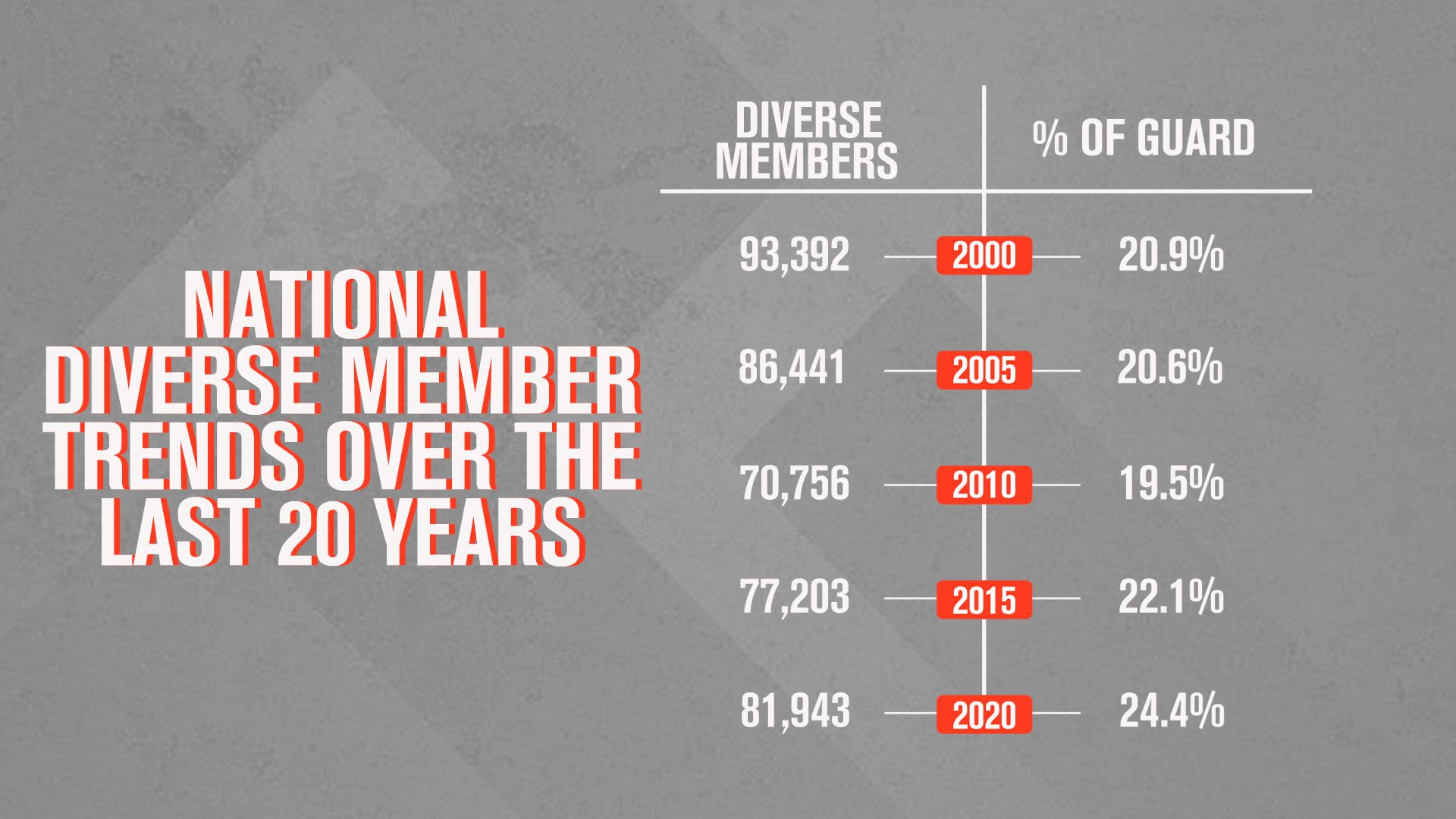
For a deeper look at the Kentucky National Guard and other units' numbers, click here.
For a deeper look at the Kentucky National Guard and other units' numbers, click here.
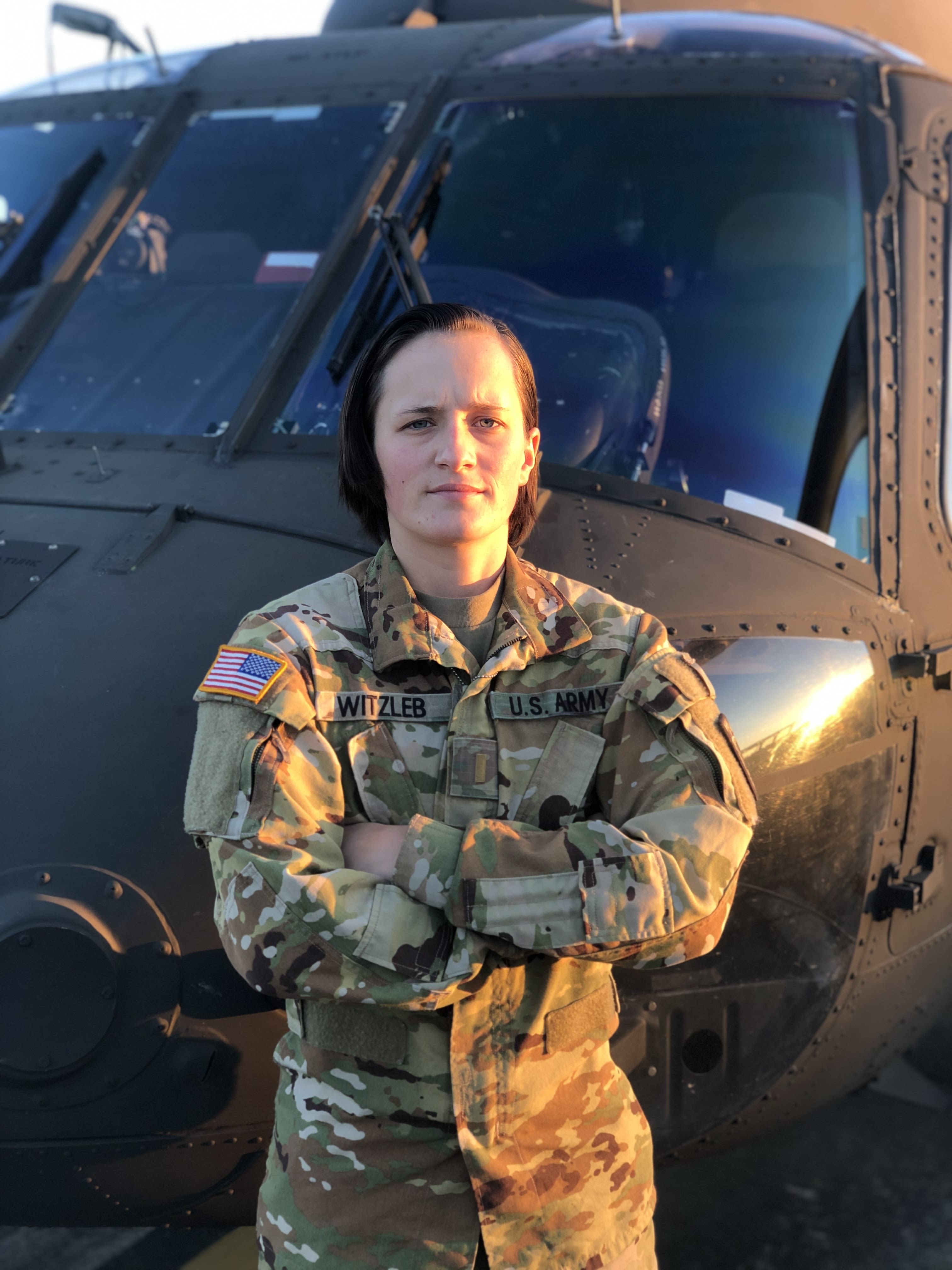
Madison: 1st Lt. Madison Witzleb stands with a UH-60M Blackhawk helicopter after attending the UH60M flight school course. Witzleb served as an aviation operations specialist before becoming a Blackhawk helicopter pilot. Photo courtesy of Madison Witzleb.
Madison: 1st Lt. Madison Witzleb stands with a UH-60M Blackhawk helicopter after attending the UH60M flight school course. Witzleb served as an aviation operations specialist before becoming a Blackhawk helicopter pilot. Photo courtesy of Madison Witzleb.
To read more about the Kentucky National Guard’s work in tornado relief efforts, click here.
To read more about the Kentucky National Guard’s work in tornado relief efforts, click here.
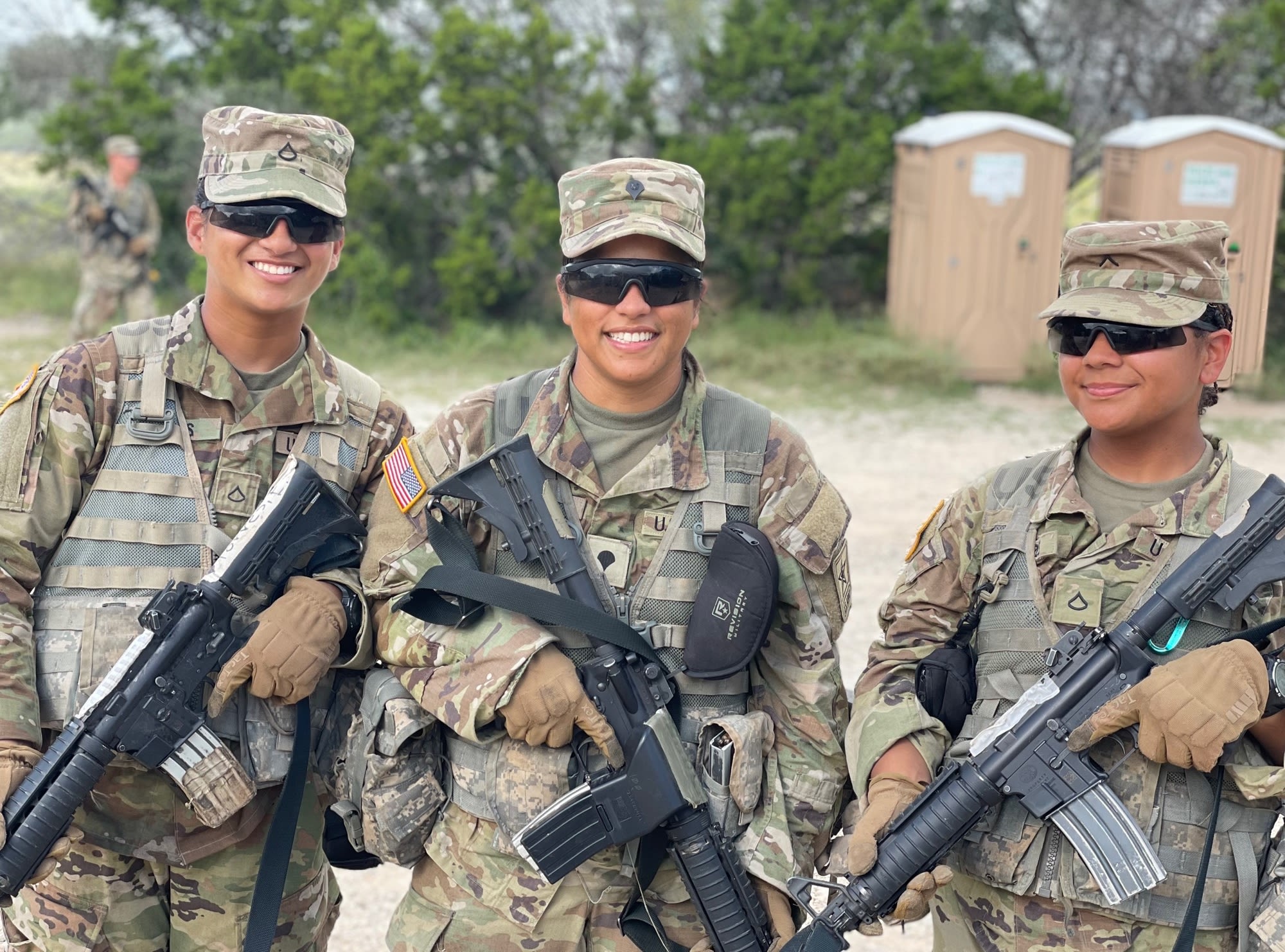
Officer Candidate Valeksa Tovar (center) stands with Elizabeth Torres (left) and Christina Torres (right) at Advanced Individual Training (AIT) in San Antonio, Texas. Tovar met Christina Torres at basic training and Elizabeth Torres at AIT, and the three have been best friends ever since. Photo courtesy of Valeska Tovar.
Officer Candidate Valeksa Tovar (center) stands with Elizabeth Torres (left) and Christina Torres (right) at Advanced Individual Training (AIT) in San Antonio, Texas. Tovar met Christina Torres at basic training and Elizabeth Torres at AIT, and the three have been best friends ever since. Photo courtesy of Valeska Tovar.
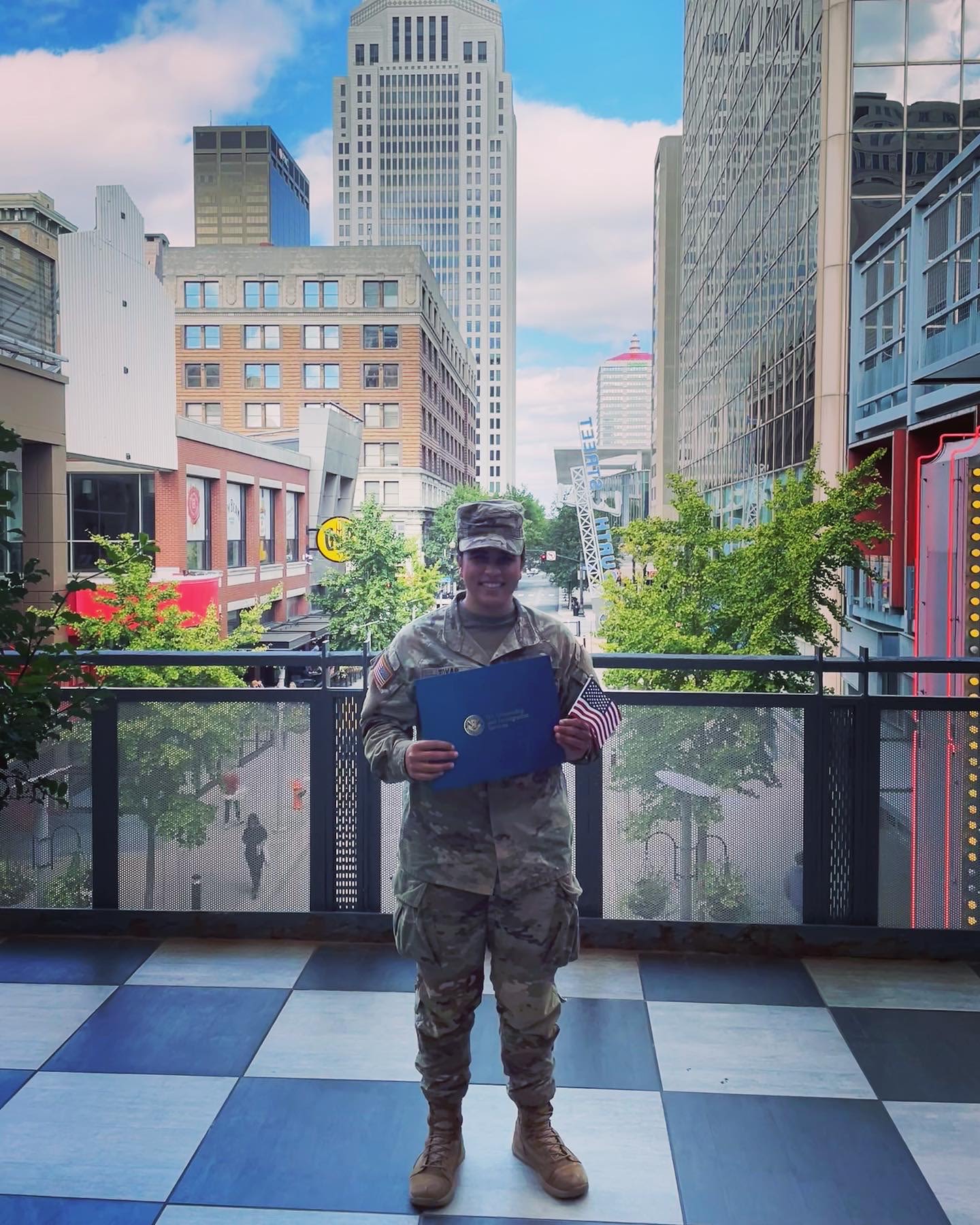
Officer Candidate Valeska Tovar officially receives her United States citizenship in Louisville, Ky. on Oct. 15, 2021. Tovar began the citizenship process during her AIT training in San Antonio, Texas. Photo courtesy of Valeska Tovar.
Officer Candidate Valeska Tovar officially receives her United States citizenship in Louisville, Ky. on Oct. 15, 2021. Tovar began the citizenship process during her AIT training in San Antonio, Texas. Photo courtesy of Valeska Tovar.
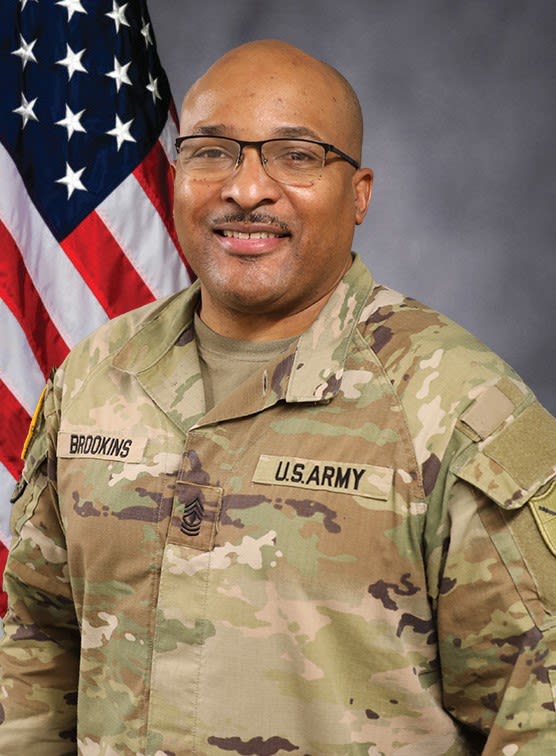
1st Sgt. Darrell Brookins poses for a photo at the Wellman Armory at Boone National Guard Center on Feb. 25, 2022. Brookins recently took over as the first sergeant of the Joint Force Headquarters for the Kentucky Army National Guard. Photo courtesy of Sgt. 1st Class Benjamin Crane and Andy Dickson.
1st Sgt. Darrell Brookins poses for a photo at the Wellman Armory at Boone National Guard Center on Feb. 25, 2022. Brookins recently took over as the first sergeant of the Joint Force Headquarters for the Kentucky Army National Guard. Photo courtesy of Sgt. 1st Class Benjamin Crane and Andy Dickson.
